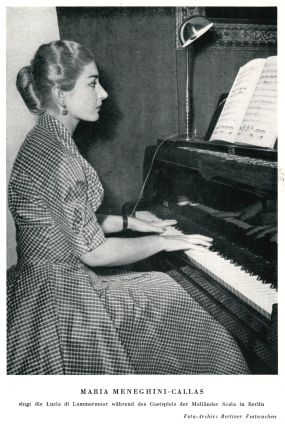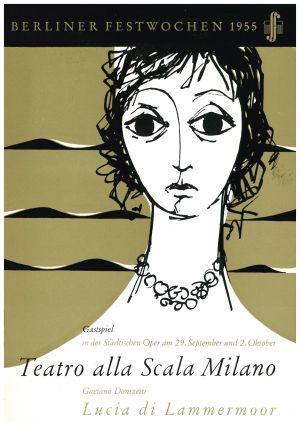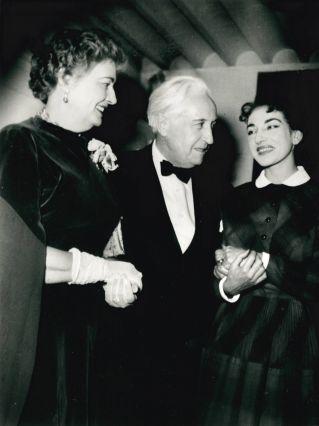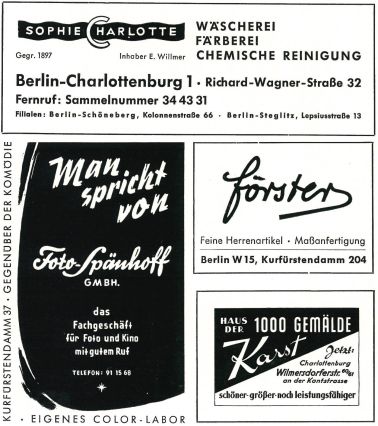Blick zurück – Lucia di Lammermoor 1955 - Deutsche Oper Berlin
Looking back - Lucia di Lammermoor 1955
Maria Callas. A prima donna without equal, the vocal phenomenon of the century (pictured here after a performance in Vienna). Everyone wants to see and hear her, just like pop stars like Billie Eilish and Adele today. On 27 September 1955, Berliners get their first chance to see her: in the Theater des Westens, the replacement venue for the Städtische Oper (the original building in Bismarckstraße is still in ruins), Callas performs LUCIA DI LAMMERMOOR - a guest performance by La Scala in Milan with the RIAS Symphony Orchestra conducted by Maestro Karajan. Afterwards: "Flowers, endless shouts, hurricanes of applause" (Der Tagesspiegel). And outside the theatre, people queue up to get an autograph or even just a glimpse of the diva.
Maria Anna Sofia Cecilia Kalogeropoulou, a daughter of Greek immigrants to the USA, was born on 2nd December 1923 in Flower Hospital, New York. At the tender age of three the little Maria was al-ready showing signs of the musical talent that her ambitious mother insisted that she work to devel-op. And in 1929, when her father opened a pharmacy in the Washington Heights area of the city, he adopted a new surname for the family, one which even today is synonymous with a supreme, other-worldly singing ability: CALLAS.
Maria’s childhood in New York was marked by her extremely difficult relationship to her mother, who dreamt of moving in polite society and preferred her older daughter Yakinthi (“Jackie”) to Maria. The expectations placed on the younger girl were to remain an issue for Maria throughout her life; years later she would still refer to the pressure she was under to achieve, recalling: “I was forced to take up singing at the age of five – and I hated it!”

The unrelenting pressure from Maria’s mother and her rough treatment of the little girl caused friction between the parents, whose marriage was already on foundering, not helped by an unambitious, man-about-town husband. After the divorce in 1937 Maria’s mother returned to Athens with the two girls, where they lived in poverty in the city’s Patisia district for the next eight years.
Maria’s mother was initially unsuccessful in her attempts to have her daughter accepted at the capi-tal’s celebrated conservatoire, but her persistence paid off, with Maria Trivella finally agreeing to ad-mit the prodigy to the relatively new institution. Years later she remembered her pupil as “a podgy, pimply girl” who wore thick, clunky glasses. Despite the rather unflattering description, it was Trivella who laid the foundations of Callas’s career on the world’s stages, being the first to recognise that Maria’s natural voice type was soprano rather than alto and then adjusting her training accordingly. Two years later Elvira de Hidalgo, the Spanish coloratura soprano, took over as Maria’s singing tutor, afterwards recalling her first audition thus: “[I heard] this tempestuous, extravagant cascade of sound – undisciplined, yet packed with drama and feeling.”
Following a succession of appearances in lieder recitals and in minor opera roles, Maria landed her first title role, singing TOSCA at the Greek National Opera in August 1942, aged 19. Shortly afterwards she tasted triumph in her role as Marta in Eugen d’Albert’s TIEFLAND: “This rising star in the Greek firmament imbued the role with an astonishing depth of feeling and delivered a performance of thes-pian brilliance to rival that of any established interpreter of tragic roles. In response to her extraordi-nary voice and her innate lightness of touch, the only possible comment is that Kalogeropoulou is one of those people with a God-given talent that we can only gasp at!” (Vangelis Mangliveras in “To Radiophonon” magazine).
Following the liberation of Greece at the end of the Second World War, Elvira de Hidalgo advised her pupil to make a name for herself in Italy, but after a concert tour of Greek cities, Maria resolved to return to New York to see her father and audition at the Metropolitan Opera.

On 14th September 1945 Callas embarked in Piraeus for America, the beginning of a breathtaking international career which, a decade later, would find her making her debut in Berlin. On 27th Septem-ber 1955 she appeared at the Theater des Westens, the venue substituting for the Städtische Oper on Bismarckstrasse, which was still in ruins), singing the title role in LUCIA DI LAMMERMOOR – a guest performance by La Scala Milan with Karajan conducting the RIAS Symphony Orchestra. The notice in the Tagesspiegel described »flowers raining down, calls of »Bravo!«, thunderous applause«. Long queues of people formed outside the theatre, hoping for an autograph or merely a glimpse of the diva.

Callas was to pay only three other visits to Berlin. In October 1959 she gave a concert in the Titania-Palast backed by the Radio-Symphonieorchester under the baton of Nicola Rescigno and singing arias from DON GIOVANNI, DON CARLO among other works. Footage of her arriving at Tempelhof Airport was carried on the evening news: Listen here ardmediathek!

On 17th May 1963 Maria Callas returned for her first and only concert at the Deutsche Oper Berlin, which had reopened only 18 months before. With Georges Prêtre conducting, the evening featured arias from SEMIRAMIDE, NORMA, NABUCCO and LA BOHÈME. In her final concert at the Berlin Philharmonie in October 1973 Callas teamed up with Giuseppe di Stefano and Ivor Newton on the piano to sing duets from works that included L’ELISIR D’AMORE, CARMEN and LA FORZA DEL DESTINO.
On 8th and 10th April you are invited to witness the revival of Callas on our stage in 7 DEATHS OF MARIA CALLAS, Marina Abramović’s personal homage to the diva 7 Deaths of Maria Callas!





